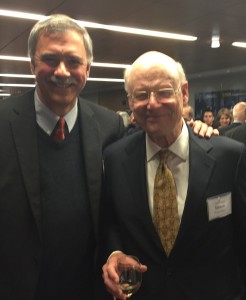Ended soon
This post is by ISC’s President George Hamilton.
Thanksgiving is a great time for reflecting on the people and institutions who have meant so much to myself and to ISC – like the Rockefeller Brothers Fund and its early leaders. Last week, the Rockefeller Brothers Fund celebrated its 75th anniversary, and I was delighted to be in attendance, since ISC has had a very special relationship with RBF for all of our 25 years.

In June 1990, six months before RBF turned 50, Colin Campbell, RBF’s President, approved a $25,000 planning grant to help Madeleine Kunin, Jonathan Lash, Doug Costle and me organize and establish the Institute for Sustainable Communities. Although larger grants from the MacArthur Foundation, Rockefeller Foundation, the Charles Stewart Mott foundation, and the U.S. Environmental Protection Agency soon followed, it was that first vote of confidence from RBF and Colin that inspired other funders to lend their support. Since then, ISC has raised nearly $200M supporting our work with local leaders in 30 countries.
As part of the anniversary celebration, Bill Moyers interviewed a panel which included Steven Rockefeller, former RBF Presidents Colin Campbell and Bill Dietel, current Board Chair Valerie Rockefeller Wayne and RBF President Stephen Heintz.
“How can such a small foundation have such a big impact?“ Moyers asked. In classic RBF style, the panelists were modest, citing the vision of the founders and the excellence and energy of their staff and partnering organizations. As a leader of one of those organizations, however, I have a few thoughts of my own on how they’ve achieved such amazing impact:
The RBF Board, recently led by Steven (1998-2006) and the late Richard Rockefeller (2006-2013), hired humble yet confident and experienced presidents who are more interested in celebrating the accomplishments of others than in taking credit for themselves. They established a culture that encourages trust and collaboration. They recruited smart people (like program officers Bill Moody, Shenyu Belsky, Nancy Muirhead and Michael Northrop) and gave them latitude to innovate and collaborate, and to advise and coach grantees. RBF gives grants that are small but strategic. They leveraged Rockefeller family influence and connections, and they have welcomed feedback and advice as they execute a philanthropic strategy focused on democratic practice, peace-building and sustainable development.
The panel reflected on the colorful and principled history of the foundation – including RBF’s recent and famous decision to divest from fossil-fuel related stocks as part of its commitment to addressing climate change. This was a particularly significant move for a foundation originally created with the profits of the Standard Oil Company.
ISC has become the organization it is today in part through the support of the quiet and thoughtful visionaries at RBF. We are proud and thankful to be associated with such a remarkable institution as they celebrate 75 years of philanthropy.
